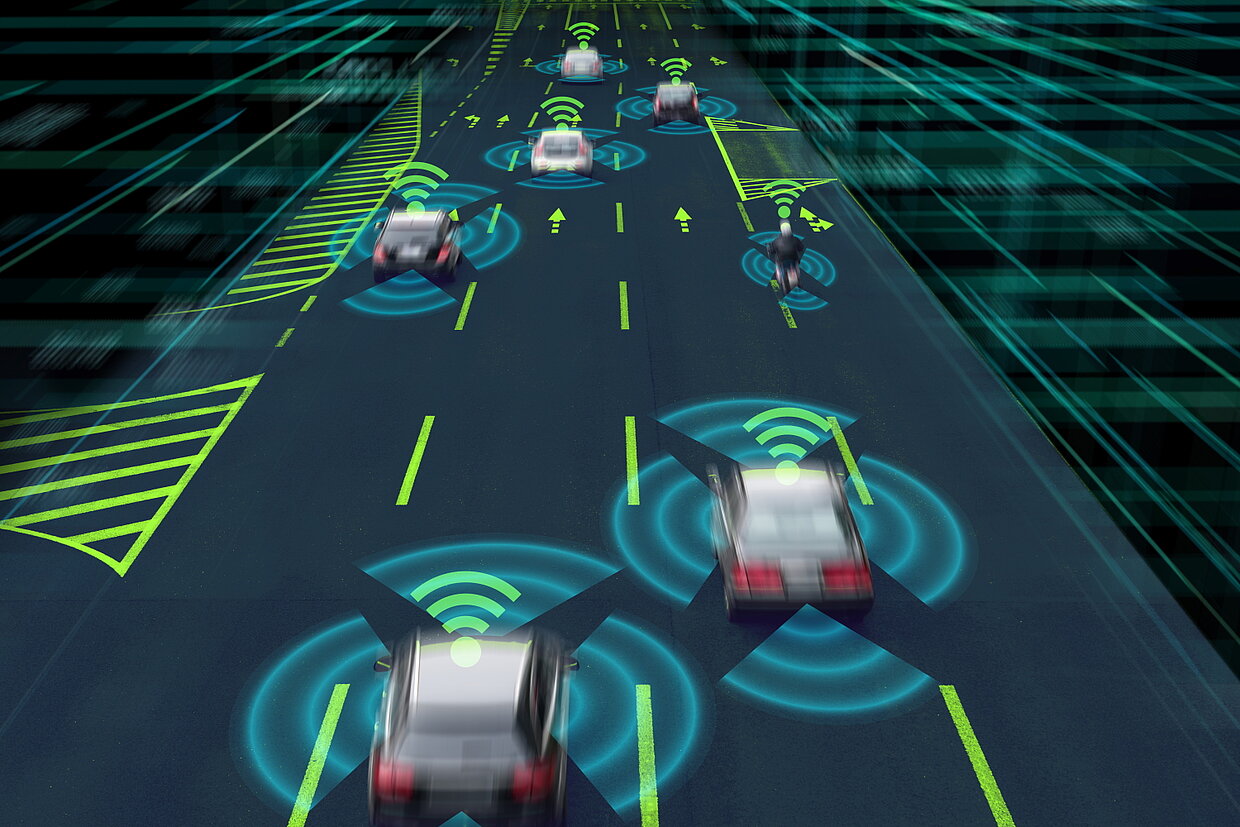
Digitalization and artificial intelligence play a key role in future mobility concepts. They will fundamentally transform the mobility system and have the potential to relieve consumers, the environment, infrastructure, and resources. Their goal is to make mobility safer, more efficient, more sustainable, and more convenient. e-mobil BW supports numerous projects and initiatives related to digitalization and software in the mobility sector.

The digitalization of mobility offers both significant opportunities and complex challenges for the economy and society - and plays a determining role in driving the mobility transformation process. Enabling technologies such as connectivity, big data, and artificial intelligence are paving the way for intelligent networking, automated driving, real-time traffic management, and demand-driven mobility solutions. These developments are giving rise to new business models such as ride sharing, car sharing, and on-demand services, making mobility more personalized, connected, and efficient.
An increasing share of automotive value creation will in the future stem from innovative IT solutions. Key technologies such as 2D and 3D sensors, cameras, actuators, and intelligent software and hardware enable vehicles to communicate with their surroundings, perceive situations, and respond accordingly - forming a core component of future mobility.
The Strategic Dialogue for the Automotive Sector Baden-Württemberg (SDA) has made data a central area of action in order to strengthen the region’s position as a leader in data-driven mobility solutions. Similarly, the digitalization strategy digital.LÄND focuses on environmentally and resource-friendly mobility that delivers tangible benefits for citizens.
Through its cluster and network activities, e‑mobil BW drives the initiation of numerous research and application projects focused on advancing key technologies. In doing so, the state agency strengthens the competitiveness and appeal of Baden-Württemberg.
Within the Network Intelligent Move, the potential and challenges of digital mobility are explored and further developed in collaboration with research institutions and industry partners from Baden-Württemberg.
The Automotive Software Collaboration BW - The FOSS-LÄND Community serves as a central point of contact, supporting companies in their involvement with open-source software projects and promoting networking within the automotive sector.
Automated and connected driving is a significant growth area in the mobility industry, encompassing numerous technological components such as sensors, cameras, evaluation software, and electric steering systems. In Baden-Württemberg, many players from science and industry are driving this development forward. Cross-industry cooperation and exchange in the innovation process are crucial for successfully designing new mobility solutions. e-mobil BW supports numerous projects on automated and connected driving in Baden-Württemberg.
The transition from hardware-based vehicles to the Software Defined Vehicle (SDV) marks a fundamental shift in the automotive industry. Traditionally, vehicles relied on mechanical and electrical components, with new functionalities typically requiring physical modifications. However, with increasing digitalization, software components are gaining prominence and now play a central role in vehicle control and functionality.
Modern vehicles increasingly integrate data-driven features and intelligent systems such as Advanced Driver Assistance Systems (ADAS), infotainment platforms, and real-time diagnostics - all enabled by software. SDVs offer greater flexibility and adaptability, as software updates can introduce new features or enhance existing ones without the need for physical changes to the vehicle. This allows manufacturers to respond more quickly to market demands and technological advancements, improving both vehicle efficiency and safety.

Managing and processing the immense volume of mobility data holds great potential but also presents significant risks. Big Data is not only becoming big business; it is also emerging as a strategic design task for policymakers and a societal challenge. The implementation of high and full automation raises numerous accompanying questions beyond the purely technological particularly in the areas of law, ethics, IT security, and data protection. All of these issues must be addressed in parallel to enable sustainable mobility solutions.